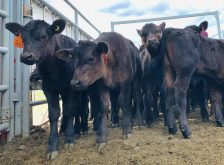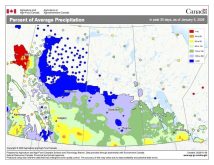R-CALF USA, the rancher group Canadian beef producers love to hate for trying to block imports, has another target these days – big U.S. packers.
R-CALF’s call for tougher enforcement of the 1920s-era Packer and Stockyards Act came under fire at the recent Canadian Cattlemen’s Association semiannual meeting.
CCA director of international relations John Masswohl said that even though the discussion around the Grain Inspection, Packers and Stockyards Administration (GIPSA, the U.S. government body charged with enforcing antitrust rules) did not appear to take aim at imports directly, but was a “sinking ship for all of us.”
Read Also

Taking the farmers’ market online
Two Albertans, who have a cow-calf operation near McRae, had the idea to create Arvo, an online farmers’ market, after being unable to find beef from within their own community.
Steve Fogelsong, president of the U.S. National Cattlemen’s Beef Association (NCBA), said that at first glance, the proposal appears “benign” and aimed at “getting the packer off our backs.”
“But when you start digging into this, it is probably the widest, most sweeping change in the cattle industry in the United States in probably a century,” said Fogelsong.
Dream come true
“It is a trial lawyer’s dream come true,” he added, because it would allow a cattle seller to sue a packer if they suspected that it was unfairly offered a price lower for cattle than another seller.
Fogelsong said the proposal would hurt the very people it is purported to help, by eliminating quality premiums. In such cases, the packers would pay a flat rate for all cattle, then sort them according to quality and absorb the profits themselves.
“A packer said to me recently, ‘I am going to pay one price for all my fat cattle because I am not going to open myself up to litigation,’” said Fogelsong. “If you’re a purebred producer, forget quality. All it’s going to be about is feed efficiency and gain.”
R-CALFUSA , anacronymfor the Ranchers-Cattlemen Action Legal Fund, United Stockgrowers of America, blames imports from Canada and Mexico for driving ranchers out of business and leading to the lowest herd numbers in 50 years.
More transparency
The group is calling on GIPSA to enforce more transparency in the country’s packing and feedlot industry.
In its latest high-profile campaign, R-CALF is urging at least 25,000 of its members to attend a one-day joint competition workshop hosted by the USDA and Department of Justice in Fort Collins, Colorado on Aug 27.
Industry sources say the campaign is all the more worrisome because the current U.S. administration appears to be sympathetic to the group’s views on the issue.
In a press release on the group’s website, R-CALF USA marketing committee chair Dennis Thornsberry stated that the group’s goal is “to put an immediate and permanent halt to the anticompetitive practices and antitrust activities of the market-dominating multinational meat packers that are rapidly causing the U. S. cattle industry to shrink.”
CCA president Travis Toews said that the impact on Canadian ranchers from the proposed GIPSA rule changes remains to be seen.
“One thing is clear, in the event that this rule causes the price of live cattle to drop in the U.S., that will affect the health of the industry in North America,” said Toews.
Defending interests
National Farmers Union director of research Ross Hinther said that both sides in the proposed GIPSA rule debate are defending their own interests.
For all the fear and loathing expressed by Canadian ranchers of R-CALF USA , mainly due to the group’s history of lobbying to shut the border, he said it appears to be a genuine “producer organization.”
According to his understanding of the situation, all that is needed for the proposal to go ahead is for GIPSA to enforce existing legislation.
“The regulations say that if you offer a sweetheart deal to one producer, you must offer it to them all and you must disclose the sweetheart deal,” said Hinther, adding that the real issue is transparency.
“The GIPSA regulations are in favour of premiums, but you must disclose the reason for that higher or lower price. It must be published. “
The NFU has studied the effects on prices paid to producers of increased packer consolidation on both sides of the border, he added, and found that the situation is worse in Canada than in the U.S. with two packing firms in Canada controlling 80 per cent of the market.
“We have a lot of secrecy, I think, in the Canadian industry. Right now, all the two major buyers have to do is have one sit on his hands and the price goes downhill really fast.”
———
“But when you start digging into this, it is probably the widest, most sweeping change in the cattle industry in the United States in probably a century.”
STEVE FOGELSONG
NCBA














